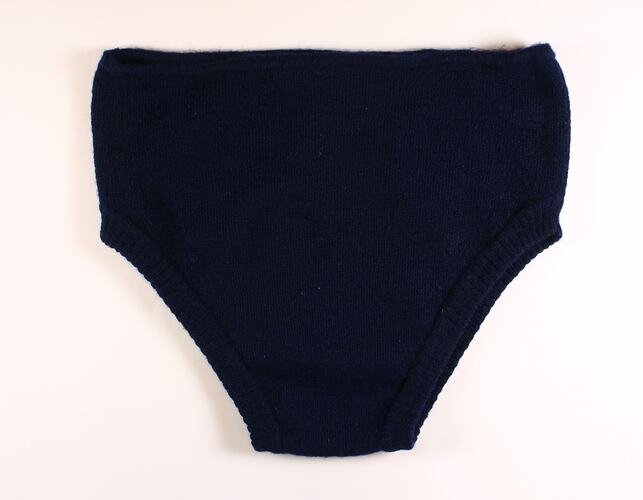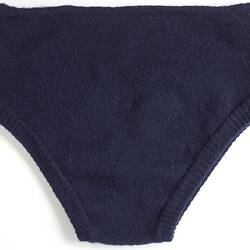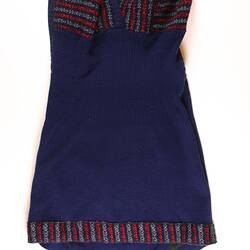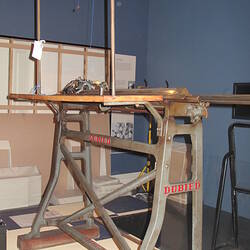Summary
This pair of woollen male bathing trunks was made by Italian migrant Edda Azzola on the family knitting machine in Italy in the 1950s. Edda was a domestic knitting machinist by trade and made two pairs of bathing trunks for her husband and a pair of bathers for herself for them to take to Australia. Edda wore her bathers only a couple of times.
Edda Azzola, nee Pugnetti, was born in 1927 in Moggio Udinese in the Friuli region, northern Italy and the family moved to nearby Pontebba four years later. After their early schooling, Edda and her two sisters worked as knitting machinists from the family home, at which time they also produced their trousseaux which was stored by their mother in a chest. She married Angelo Azzola, a young man from her village. Searching for change, adventure and a better life, Edda persuaded her husband to migrate to Australia in 1954 and Edda followed a year later in 1955. Her glory box followed her later. They lived in Carlton and Fitzroy in inner Melbourne during the early years and Edda purchased an Italian knitting machine from another Italian migrant woman in Melbourne and worked as a textile factory outworker for about 20 years.
Physical Description
Dark blue machine knitted mens' bathing trunks.
Significance
These bathers are symbolic of the expectations many migrants had of the beach and leisure culture available in Australia. They also represent the industrial skills brought to Australia by migrant women, in this case applied to personal domestic objects.
The Edda Azzola knitting machine collection enables the exploration of issues relating to post World War II migration experiences, outworker working life, the post-war inner city Melbourne textile industry and dowry production. The collection, which includes a domestic knitting machine, tools, materials, textile samples, garments, a design notebook, photographs, an oral history interview, operator demonstration video and hand made glory box items, all combine to create a rich snapshot of working and migrant life, particularly significant with the large numbers of migrant women who were employed in and for textile factories around the city. This story and collection is also enriched by its close connection to the Richard Charlupksi story, for whom Edda worked and which explores the 1950s-1970s wool fashion industry.
More Information
-
Collecting Areas
Migration & Cultural Diversity, Clothing & Textiles, Leisure
-
Acquisition Information
Donation from Mrs Edda Azzola, 17 Dec 2007
-
Maker
-
User
Mr Angelo Azzola, Carlton North, Greater Melbourne, Victoria, Australia, late 1950s
-
User
Mr Angelo Azzola, Fitzroy North, Greater Melbourne, Victoria, Australia, late 1950s
-
Classification
-
Category
-
Discipline
-
Type of item
-
Object Measurements
350 mm (Width), 302 mm (Height)
-
References
'Glory Boxes: Femininity, Domestic Consumption and Material Culture in Australia, 1930-1960', Moya McFadzean, phd thesis, 2009
-
Keywords
Immigration, Italian Communities, Italian Immigration, Leisure Activities, Swimwear, Textile Industry



